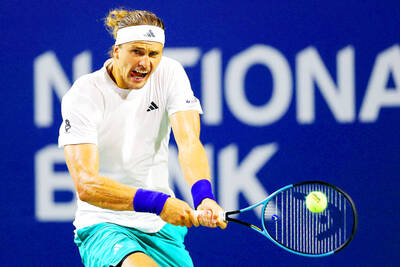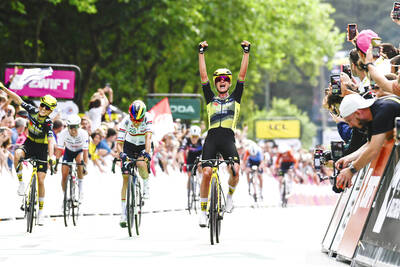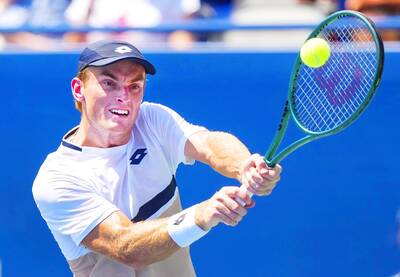Michel Platini, at one time the outstanding French soccer player of his day, dropped by Jerusalem earlier this month. He was received by Israeli President Shimon Peres and the two men discussed what role soccer might play toward peace in the Middle East.
The pair had been down this road once before. Three years ago, Peres and Platini helped put together a team of Israelis and Palestinians who took on a Spanish team in Seville. Now, Platini is the initiator. He visited Jerusalem in his capacity as the head of UEFA and offered Israel the prospect of hosting international tournaments if enough stadiums could be built.
Platini is trying, for a second time, to transform soccer. He fought in his school days for the sport to be an accepted profession in France. He transcended his game as a creator who could and did transform his generation. And he made his fortune in his father’s homeland, with the Italian club Juventus.
But in his second career, the often excruciating transition that professional sports figures face, Platini is taking on an even more difficult task.
Platini seeks something rather complex. He is trying to unite under a common set of operating principles the 53 members of UEFA: 27 states inside the EU and 26 outside it, including the whole of the former Eastern European bloc, and nations that lie outside the geographic borders such as Turkey and Israel. His ambition is to level the playing field between rich teams, those with TV contracts and billionaire owners, and the smaller fry who rely mostly on fan support.
He would like to rein in teams like Real Madrid, which spent US$433 million this summer to buy the rights to four superstars, and the big name teams from the high-level English Premier League. Some of these, like Chelsea and Manchester United, are bankrolled by sugar daddies from Russia, the US and the United Arab Emirates.
In February, Platini addressed the European Parliament for, appropriately, the 90 minutes that it takes to play a soccer match.
In an interview, he spoke about the January trading period, in which star players are transferred for millions of dollars from small market clubs to the dominant teams, which then sign the players to expensive contracts. One club in England, for example, bid US$150 million for the registration of a single player, the Brazilian Ricardo dos Santos Leite, known as Kaka, from AC Milan. (He ultimately signed with Real Madrid.)
“Is it morally acceptable to offer such sums of money for a single player?” Platini asked the lawmakers.
He said he would do everything he could to ensure that soccer operates within European law provided they amend the law to let him govern the sport. To do that, he said, he needed a US-style system that restricted spending to a percentage of every team’s revenues.
“We are currently looking at the idea of limiting, to a certain degree, a club’s expenditure on staff — salary and transfer fees combined — to an as yet undecided percentage of its direct and indirect sporting revenue,” he said.
Platini wanted to restrict the power of big clubs to sign up large numbers of players, particularly those under the age of 18. European law, however, prohibits any quota system that would deny the rights of workers to be employed anywhere they or the clubs choose. Restrictions on competition for players or on the right of workers to seek maximum compensation — familiar fixtures in the landscape of US sports — are illegal.
There were, and possibly still are, members of the European Parliament who believe in the adage that a soccer player is a person whose brains begin in the toes and end at the knees. The skepticism toward an ex-player pleading the case that soccer needs what sports get in the US — some acknowledgment of their special place in society, some freedom to develop their own laws — was palpable.
However, in September the European Commission held a conference on licensing systems for club competitions. This conference, for all sports, broadly supported Platini’s determination to bring big teams within Europe in a scheme to regulate the spending of clubs.
Perhaps just as surprising as the EU arguing the case for UEFA’s new proposals was the fact that Platini’s proposal was backed by leading clubs.
“I am nothing, just one man,” Platini said. “But I was elected by the national associations because I promised to make financial fair play in soccer. I don’t want to be above the law, I know that we could lose in the courts if clubs use lawyers to stop us imposing limitations. I asked the politicians to help protect us, if they trust what we are doing.”

The 2025 International Federation of Bodybuilding and Fitness (IFBB) Mr Universe Chinese Taipei competition began yesterday at Xinzhuang Gymnasium in New Taipei City, with more than 150 athletes showcasing their physiques. It is the first time in 16 years that the IFBB has held a competition in Taiwan, the last being the 2009 World Games in Kaohsiung. The professional bodybuilding contest is bringing together athletes from Taiwan and 16 other countries, including Malaysia, Japan, the US, France and Mexico. IFBB Chinese Taipei president Hsu An-chin said in an interview yesterday that the event came to Taiwan thanks to his lobbying efforts at last

Top seeds Alexander Zverev of Germany and American Coco Gauff on Tuesday advanced to the third round of the Canadian Open after both players were pushed hard by their opponents. World No. 3 Zverev, playing in his first match since his first-round loss at Wimbledon, was far from his best, but emerged with a 7-6 (8/6), 6-4 win over Adam Walton under the lights in Toronto. Momentum shifted firmly in Zverev’s favor when he won a 52-shot rally in the first set tiebreak and he sealed the win on a double fault by the Australian in the second set. “It was a very

Cycling great Marianne Vos won the opening stage of the women’s Tour de France with a brilliant late attack on Saturday. The 38-year-old Dutchwoman overtook her Visma–Lease a Bike teammate Pauline Ferrand-Prevot approaching the line, and then held off Mauritian rider Kim Le Court in the closing meters of a grueling uphill finish. Ferrand-Prevot looked set to win the stage, but the Frenchwoman attacked too early from 600m and could not withstand the late surge from Vos, who punched the air with her left fist as she crossed the line. Moments later, Vos hugged an exhausted-looking Ferrand-Prevot, the Paris-Roubaix winner. “I didn’t know if

TAIWANESE EXITS: Fellow Australian Christopher O’Connell joined Tristan Schoolkate as a winner following his 6-1, 6-2 defeat of Tseng Hsin-chun Australian qualifier Tristan Schoolkate on Monday dispatched rising Brazilian talent Joao Fonseca 7-6 (7/5), 6-4 at the ATP Toronto Masters, ensuring a breakthrough into the world top 100. The 24-year-old from Perth moved to 98th in the ongoing live rankings as he claimed his biggest career victory by knocking out the ATP NextGen champion from November last year. Schoolkate, son of a tennis coach, won his first match over a top-50 opponent on his sixth attempt as he ousted the world No. 49 teenager from Brazil. The qualifier played a quarter-final this month in Los Cabos and won through qualifying for his